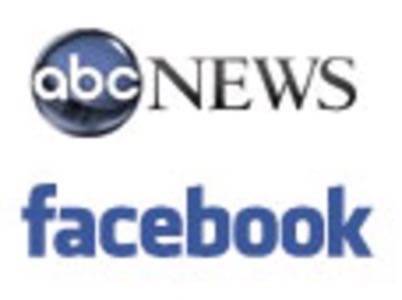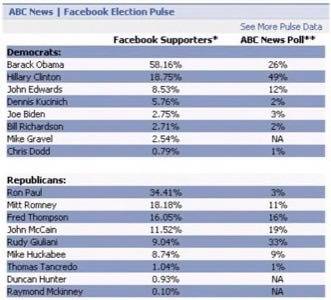The New York Times is reporting that ABC News and Facebook have formed a partnership that will bring ABC political coverage to Facebook while lending social networking cred to the old media network. Part of the alliance has Facebook signing on as a sponsor of the ABC Democratic presidential debate on January 5th, 2008 in New Hampshire — just days before that state’s primary election and after the Iowa caucuses.

Both ABC and Facebook are late to the party. CNN and YouTube were the first told hold a new-meets-old media mashup debate (the Republican version will be held this week), and MySpace teamed with MTV for their ongoing candidate dialogues.
New media technologies are taking a bigger role in US election politics than they ever have, with candidates blogging, posting videos, using social networks like MySpace, Facebook, and LinkedIn, and Twittering. A stop at the Googleplex for an interview with Eric Schmidt has become an almost required campaign event this election cycle, and even web tech-focused blogs like TechCrunch are getting in on the act by interviewing US presidential candidates (today they talked with Barack Obama).
However, even as we’re seeing an unprecedented use of web 2.0 technologies in campaign politics, it’s unclear how much of it is making a difference. CNet’s Caroline McCarthy is skeptical. She notes that while the Facebook group “One Million Strong for Barack Obama” has 164,000 members, a parody group for television personality and author Stephen Colbert has over 1.5 million — and crossed the million mark in just over a week. And though the New York Times and Washington Post both have Facebook applications, the most popular remain fun time wasters dealing with music, movies, games, and annoying your friends, not serious apps that deliver news.
For all the hype surrounding social networks, and even all the apparent buzz candidates can build on them, it is dubious whether there will be an actual benefit at the polls.
This is something we have noticed as well. In August, we wrote that though the Internet has provided a cost-effective way for candidates to get their message out, and has given a platform for long-shot candidates like Dennis Kucinich and Ron Paul that has allowed them to stay in the race, the numbers seem to indicate that Internet celebrity does not necessarily translate to the polls (though, with no ballots cast, we’ll have to wait to see if that holds up).

The ABC Facebook page actually has a chart confirming some of these discrepancies by comparing support from the candidates’ official Facebook pages to the results of a recent ABC News poll of likely voters. For both parties, the polled front-runner nationally is not the leader on Facebook (for Republicans the data is more out of sync than for Democrats). As a commenter surmised on our Web 2.0 Election post, this may have something to do with the international nature of social networks versus the domestically targeted nature of the presidential opinion polls.
Further, the most recently completed ABC News/Facebook political poll (asking What is “the number one issue [you] look at when evaluating Presidential candidates”) drew just over 1,000 votes. With over 17 million users in the US over voting age (according to Facebook’s ad targeting tool), 1,000 participants in an open poll is a microscopic number. To echo Caroline McCarthy, maybe ABC News can pull it off, but I’m incredulous.
What do you think? Can social networks really make an impact with political campaigns? Are ABC and Facebook too late to the party?

















